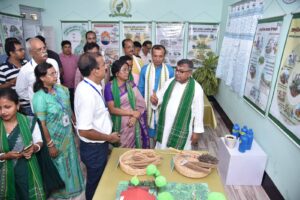Tripura unveiled its first statue of Dr. M S Swaminathan, the Father of India’s Green Revolution, at the State Agriculture Research Station. Agriculture Minister Ratan Lal Nath announced Tripura’s new role in certifying paddy seeds for Mizoram and Manipur while promoting integrated farming for sustainable and profitable agriculture.
In a historic tribute to one of India’s most celebrated agricultural scientists, Tripura unveiled its first statue of Dr. M S Swaminathan—the legendary “Father of the Green Revolution”—at the State Agriculture Research Station (SARS), AD Nagar, on Wednesday.
The unveiling ceremony was marked by reverence and gratitude, attended by Agriculture and Farmers Welfare Minister Ratan Lal Nath, senior government officials, local leaders, and the farming community. The event highlighted both Dr. Swaminathan’s monumental contributions to Indian agriculture and Tripura’s growing role in ensuring food security for the Northeast.
A National Tribute to the Father of Green Revolution
Speaking at the ceremony, Agriculture Minister Ratan Lal Nath praised Dr. Swaminathan’s lifelong dedication to ensuring food self-sufficiency and promoting sustainable farming practices. He reminded the audience that India once depended heavily on foreign nations for food imports. “There was a time when our Prime Ministers had to seek food grains from other countries. Today, under Prime Minister Narendra Modi’s leadership, India is exporting agricultural produce globally,” Nath stated.
The minister also lauded the central government for bestowing Dr. Swaminathan with long-overdue recognition. He recalled that Prime Minister Narendra Modi had recently instituted a global award in Swaminathan’s memory. This award aims to honor scientists from developing nations who make significant contributions to “Food and Peace,” echoing Swaminathan’s vision of science-driven agricultural progress.
Emphasis on Integrated Farming
During his address, Nath strongly advocated for integrated farming, a holistic agricultural model long championed by Dr. Swaminathan. He explained that integrated farming encourages farmers to diversify activities beyond traditional crop production, incorporating livestock rearing, aquaculture, agroforestry, and crop rotation.

“Integrated farming maximizes resource utilization, minimizes waste, and enhances productivity,” Nath explained. “Our government is urging farmers to adopt this model, and we are here to support them every step of the way.”
He stressed that such an approach not only improves farmers’ incomes but also builds resilience against environmental and economic challenges. Integrated farming, he added, reflects Swaminathan’s core philosophy of ensuring both sustainability and profitability for farmers.
Tripura to Certify Paddy Seeds for Northeast States
In a major announcement, Nath revealed that the central government has authorized Tripura to certify paddy seeds for neighboring states like Mizoram and Manipur. This move not only positions Tripura as a hub of agricultural excellence but also ensures quality seed distribution across the Northeast, fostering regional self-sufficiency.
Nath highlighted ongoing research at the State Agriculture Research Station, focusing on improved rice varieties and horticultural innovations at Nagicherra. Such initiatives, he said, would empower farmers with better technology and crop options, further advancing the state’s agricultural productivity.
A Legacy of Food Security
The event was also attended by Badharghat MLA Mina Rani Sarkar, West Tripura Zilla Sabhadhipati, local Corporators, and other dignitaries. The gathering reflected the wide-reaching respect for Dr. Swaminathan, whose vision transformed India from a food-deficient nation to a grain-surplus exporter.
| Also Read: Tripura Politics: Tipra Motha warns BJP of exit over Accord Non-Implementation |
Dr. Swaminathan’s legacy, the minister stressed, continues to guide India’s agricultural policy. His advocacy of sustainable methods, coupled with scientific innovation, has ensured that farmers remain at the heart of India’s food security mission.
Symbol of Inspiration for Future Generations
The statue at SARS is more than a tribute—it is intended as a symbol of inspiration for young scientists, policymakers, and farmers alike. By memorializing Swaminathan in Tripura, the state reinforces its role in carrying forward his vision of a hunger-free and agriculturally advanced India.
The minister concluded that the government’s commitment to farmers’ welfare remains unwavering, with policies centered on innovation, sustainability, and inclusivity. The unveiling of Swaminathan’s statue, combined with the new responsibility of seed certification, marks a significant step in Tripura’s agricultural journey.













